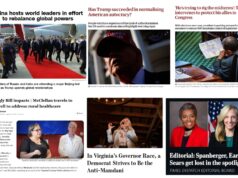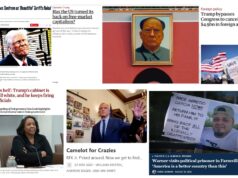 A GENIUS FOR GETTING ATTENTION
A GENIUS FOR GETTING ATTENTION
Donald Trump has been called a “buffoon.” That’s a mistake. “Buffoon” implies foolish, stupid. But Donald Trump possesses a kind of genius: He’s a genius at getting attention for himself.
One might say that the quest for attention – more than “making deals” — has been the driving force in Trump’s life. And for decades, he has succeeded in getting considerable public attention. But it is only in recent months that he’s demonstrated how extraordinary is his ability to seize – and hold – the spotlight.
America can hardly talk about anyone or anything else.
By entering the political arena, he’s had to compete with other accomplished attention-getters. But Trump has commanded more attention, probably, than all the others combined.
For that matter, has anyone in American history been more the center of attention than Donald Trump has been since his campaign announcement last summer? During these months, Trump has been putting on a show for America and America just can’t get enough of this Trump show.
(Trump succeeds in putting us who are appalled by him, who regard him as dangerous, in a bind. We feel obliged to talk about the threat that he poses. But in so doing, we also play into his hands.)
ENACTING DOMINANCE
Trump’s quest for attention has a particular flavor. Not only is there an “It’s all about me” narcissistic element, common to most attention-seekers. But what Trump wants everyone to see in him is his sheer power and greatness.
Trump is the man who puts his name on everything within his reach. He uses his name to create monuments to himself. This huge building – the Trump Tower – is me. These great airplanes, with “Trump” in big letters on their sides, are me.
In his posture of bigger-than-human, Trump has something in common with the likes of Ferdinand Marcos, the former dictator of the Philippines, who had an enormous stone mountain carved into an image of his own head, and with Saddam Hussein, whose much bigger-than-life statue stood as a commanding presence in Baghdad.
Trump has always looked for ways of getting millions of people watching him play a role of domination. The whole structure of his reality show, “The Apprentice,” was geared toward the climactic moment when Trump would tell some poor soul, “You’re fired.”
Not just dominating, but using dominance to cut “losers” down.
ATTACKING THE “OTHER”
The essence of “drama,” it has long been said, is “conflict.” And nothing seizes attention more dramatically than a fight.
It was with a statement tantamount to a declaration of war against undocumented immigrants that Trump captured national attention at the very beginning of his campaign, labeling the Mexicans among us as criminals and rapists.
Since then, he has gone on to make repeated headlines by virtually equating the entire Muslim world – of well over a billion people — with our terrorist foes. They all hate us, he says, so we should exclude them, as enemies, from joining “Us” here in America.
And now the pattern of the fight is being brought into the arenas where Trump speaks to his followers, inciting violence against protesters in their midst.
It is perhaps the main national story of the moment and, of course, Donald Trump is making sure that he is at the center of it. He is not content to let the security people handle the eviction of the disruptive. He seizes center stage of the drama with his snarling repeatedly from the podium, “Get ‘em outa here!”
It serves Trump’s theater to focus on the protesters, because a fight requires an opponent, an “other,” and the protesters provide a hated other right at hand—not crossing some far-away border, not on the other side of the earth, but intermingled with the faithful who look to their strong man, Trump, as a hero.
The media have documented well the ways Trump incites his supporters toward violence against the protesters. They “deserve” getting roughed up. We should do away with the “political correctness” that has inhibited good people like us from giving such enemies the rough treatment they have coming to them. “I’d like to punch him in the face.”
Another way that Trump has lately worked to open the path to violent abuse of the protesters is by explicitly labeling them as bad people. “These are not good people,” he has been saying. For the many people who believe that treating “bad people” badly is right, this is an invitation to violence.
Even as we see the endless replay of videos of Trump supporters punching and shoving protesters, the focus of our attention remains our American Mussolini—Donald Trump.
REINFORCING THE PATTERN THAT’S ALREADY THERE
In these rallies, a lesson is being taught—a lesson about how to deal with people on “the other side.”
Trump has scorned Bernie Sanders for once yielding his microphone to Black Lives Matter protesters, calling Sanders’ willingness to yield “disgusting,” a “disgrace.” Sanders’ attempt to make peace with his dissenters Trump disdained as “weak.”
Trump claims to be a “unifier,” but he is teaching his followers that those who are outside the in-group are enemies with whom no dialogue, no give-and-take, no meeting of minds should be sought.
He is rising to power with this recipe of conflict and scorn because he is enacting an emotional pattern already present in a large portion of the Republican base.
But that pattern, in turn, has been instilled in the base by years of right-wing rhetoric and Republican political conduct. This is a party that has systematically practiced politics as war for a generation.
So Trump is both exploiting this pattern and reinforcing it. What’s new with Trump’s way of enacting this Republican drama of strife is that – with his flagrant language, and his incitement to violence — he’s stripped it of the usual sheep’s clothing of normal-sounding political speech.
He is thus uncovering the essence of what has been building on the right for a generation. And we can’t take our eyes off it.
If we are going to give Trump theater such rapt attention, it behooves us to see clearly what it signifies. Trump is the actor, but the drama being played out is much bigger than this one man.














